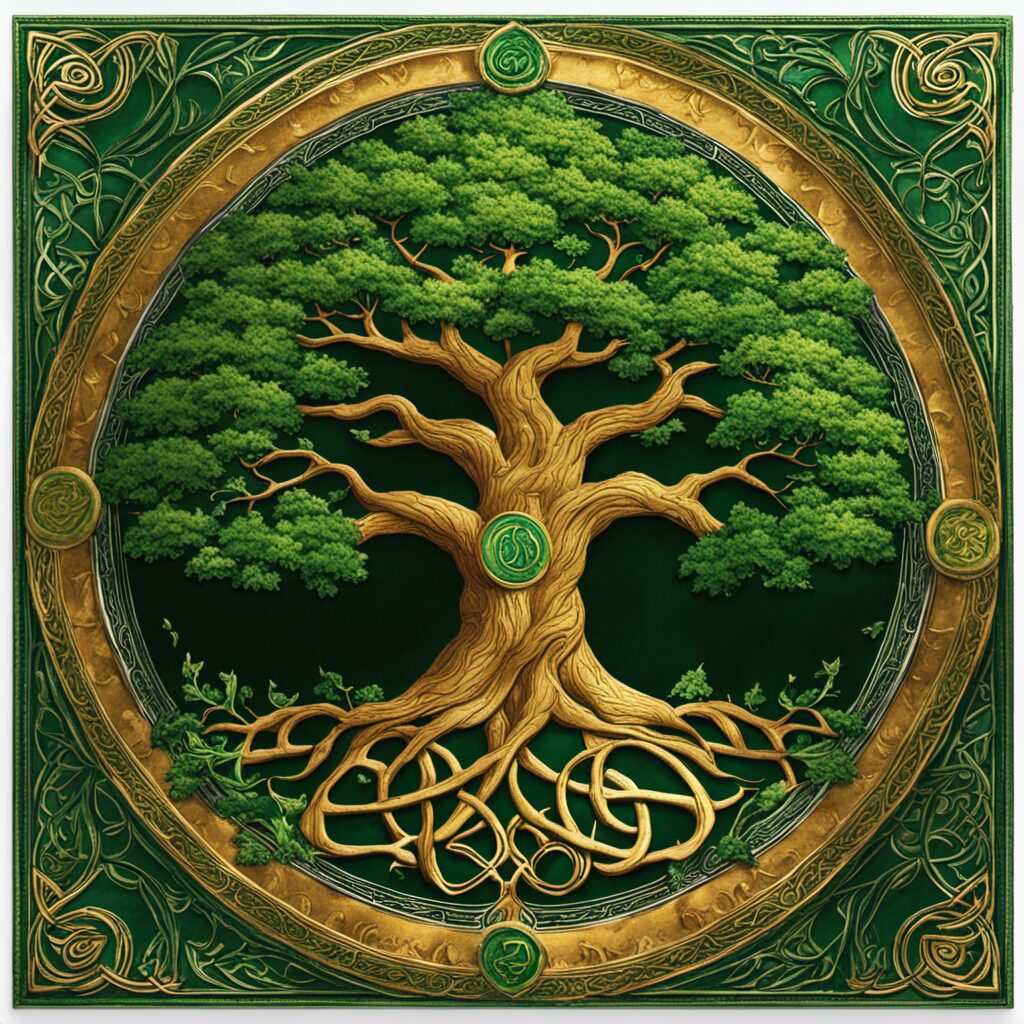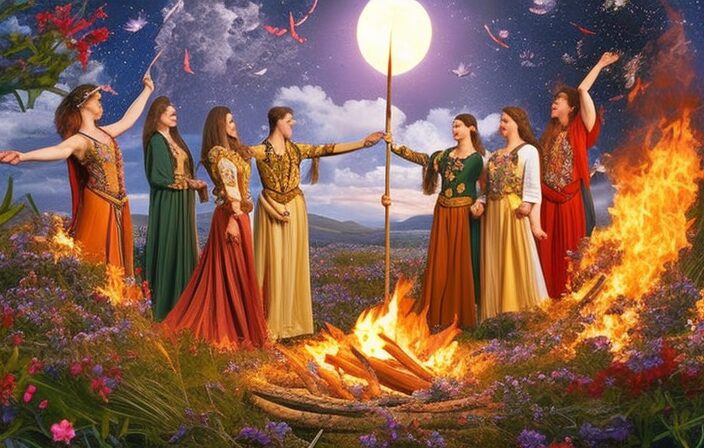In today’s modern world, where the urgency of environmental conservation has become increasingly apparent, it is crucial to explore alternative perspectives that can inform and guide our efforts.
The Celtic calendar, though originating in ancient times, offers a unique lens through which we can understand the intricate connection between nature and human existence.
By examining the influence of the Celtic calendar on environmental awareness and its potential for shaping future conservation practices, this article aims to contribute to ongoing conversations surrounding sustainable solutions for our planet.
Key Takeaways
- The Celtic calendar originated in ancient times and was connected to natural cycles and agricultural practices, emphasizing the Celtic people’s reverence for nature and its rhythms.
- Festivals and rituals tied to the Celtic calendar are aligned with seasonal changes and agricultural cycles, promoting ecological balance and responsible stewardship of the land.
- Individual actions for environmental conservation, such as conserving energy, reducing waste, and supporting sustainable choices, play a crucial role in preserving and sustainable use of natural resources.
- The Celtic calendar and its practices, including nature-based rituals and the preservation of sacred sites, contribute to the overall health of ecosystems, promote a deeper connection with the natural world, and offer ancient wisdom for addressing modern environmental challenges.
The History of the Celtic Calendar
The history of the Celtic calendar can be traced back to ancient times and is characterized by its connection to natural cycles and agricultural practices. The Celtic people, who inhabited parts of Europe from around 1200 BCE to 400 CE, held a deep reverence for nature and its rhythms. The cultural significance of their calendar lies in its ability to harmonize human life with the natural world, promoting a sustainable way of living.
The Celtic calendar was closely tied to the changing seasons and agricultural activities. It consisted of two main divisions: the solar year, which marked the solstices and equinoxes, and the lunar month, which followed the cycle of the moon. This dual system allowed for a more accurate tracking of time within both celestial and earthly realms.
Symbolism played an important role in the Celtic calendar as well. Each month was associated with specific trees or plants that held symbolic meaning related to growth, rebirth, or protection. These associations were deeply ingrained in Celtic culture and influenced their rituals and celebrations throughout the year.
Rituals were an integral part of Celtic calendar observance. They served as communal expressions of gratitude for bountiful harvests, prayers for favorable weather conditions, or ceremonies marking important life events such as births or marriages. By engaging in these rituals, individuals reaffirmed their connection to nature and sought harmony with the environment.
The Importance of Environmental Conservation
Environmental conservation is of paramount importance in today’s world.
Individual actions matter greatly in the global impact of conservation efforts. Scientifically informed research shows that small changes made by individuals can have a significant cumulative effect on the health and sustainability of ecosystems.
Individual Actions Matter
Individual actions play a crucial role in influencing the outcomes of environmental conservation efforts. While large-scale policies and initiatives are important, personal responsibility and small changes made by individuals can have a significant impact on the environment.
Conserving energy: Simple actions such as turning off lights when not in use or using energy-efficient appliances can reduce carbon emissions and conserve resources.
Reducing waste: Adopting practices like recycling, composting, and minimizing single-use plastics can help decrease landfill waste and protect ecosystems.
Supporting sustainable choices: By opting for locally sourced products, organic foods, and renewable energy sources, individuals can contribute to a more sustainable future.
Scientifically informed research indicates that these individual actions collectively add up to substantial environmental benefits. Therefore, advocating for personal responsibility is essential in promoting long-term conservation efforts.
Global Impact of Conservation
Scientific research has demonstrated the global significance of conservation efforts in mitigating environmental degradation and preserving biodiversity. Global awareness is crucial in understanding the interconnectedness between ecosystems and the impact of human activities on them.
Sustainable practices play a vital role in promoting long-term conservation efforts. By implementing sustainable practices, such as reducing carbon emissions, protecting natural habitats, and conserving water resources, we can minimize our ecological footprint and preserve biodiversity.
For instance, sustainable agriculture practices that prioritize soil health and reduce chemical inputs can help maintain ecosystem resilience while ensuring food security for future generations. Additionally, adopting renewable energy sources like solar or wind power can decrease reliance on fossil fuels, thereby reducing greenhouse gas emissions.
To achieve effective conservation globally, it is essential to raise awareness about the importance of sustainable practices and encourage their implementation at individual, community, and policy levels.
The Celtic Calendar and Its Connection to Nature


The Celtic calendar, deeply rooted in the cultural and spiritual traditions of the ancient Celts, demonstrates a profound connection between human societies and the natural world. This connection is reflected in various aspects of Celtic festivals and rituals that promote ecological balance and sustainable living.
-
Celtic festivals: These celebrations were closely tied to seasonal changes and agricultural cycles, reflecting an understanding of the interconnectedness between humans and nature. Festivals such as Beltane, Samhain, and Imbolc marked important moments in the year when people paid homage to deities associated with fertility, harvests, and renewal.
-
Ecological balance: The timing of these festivals aligned with specific natural phenomena like solstices or equinoxes. This synchronization aimed to maintain ecological balance by ensuring optimal conditions for planting crops or grazing livestock. By observing celestial movements and environmental indicators during these festivals, the Celts sought to live harmoniously with their surroundings.
-
Nature-based rituals: The rituals performed during Celtic festivals often emphasized respect for nature and its resources. Practices like tree worship or animal sacrifice were meant to honor the sacredness of natural elements while encouraging responsible stewardship of the land.
Practices for Honoring the Celtic Calendar in Environmental Conservation


Practices embedded in the observance of the Celtic calendar contribute to the preservation and sustainable use of natural resources. The Celtic calendar is deeply rooted in nature, with its festivals and rituals closely tied to seasonal changes and agricultural cycles. These practices promote a profound understanding of the interconnectedness between humans and the environment.
One such practice is the celebration of Imbolc, which marks the beginning of spring. It involves various activities like cleaning homes, planting seeds, and preparing for new life. This tradition encourages individuals to take care of their surroundings by maintaining cleanliness and nurturing plant life.
Another important festival is Beltane, celebrated on May 1st, which signifies fertility and abundance. People gather together to light bonfires as a symbol of purification and renewal. This practice promotes responsible land management by preventing wildfires, promoting biodiversity through controlled burns, and ensuring sustainable harvesting practices.
Furthermore, Samhain or Halloween honors ancestors and spirits while marking the end of harvest season. During this time, people reflect on their relationship with nature and express gratitude for its gifts. By recognizing our dependence on natural resources, this practice fosters a sense of responsibility towards environmental conservation.
Overall, these practices embedded in the observance of the Celtic calendar serve as valuable tools for environmental conservation efforts. They encourage individuals to engage with nature through sustainable practices such as land stewardship, responsible harvesting techniques, biodiversity conservation measures, and fostering gratitude towards natural resources. By incorporating these practices into our daily lives beyond ceremonial occasions, we can promote long-term sustainability and preserve our ecosystems for future generations.
Exploring the Celtic Calendar’s Influence on Environmental Awareness


Embedded within the observance of the Celtic calendar are practices that promote a heightened awareness of our interconnectedness with the natural world. Celtic traditions have long recognized the importance of ecological mindfulness, emphasizing the symbiotic relationship between humans and nature. By incorporating these principles into our daily lives, we can foster a deeper understanding and appreciation for the environment.
-
Seasonal Celebrations: The Celtic calendar consists of eight festivals throughout the year, marking significant points in the agricultural cycle. These celebrations serve as reminders to honor and respect nature’s rhythms, fostering a sense of gratitude for its abundance.
-
Nature-based Rituals: Celtic traditions often involve rituals that connect individuals to their local ecosystems. Practices such as tree planting ceremonies or river clean-ups not only contribute to environmental conservation efforts but also instill a sense of responsibility towards preserving natural resources.
-
Sacred Sites: The Celts regarded certain landscapes as sacred, recognizing their spiritual significance. Protecting these sites not only preserves cultural heritage but also safeguards biodiversity hotspots, promoting conservation on multiple levels.
The Future of Environmental Conservation Through the Lens of the Celtic Calendar
The preservation of our environment is a pressing concern in today’s world, and finding effective solutions requires a comprehensive approach that draws upon ancient wisdom and modern scientific knowledge.
By harmonizing nature and time, we can tap into the inherent wisdom of natural systems to inform our conservation efforts.
This discussion will explore how ancient practices and traditions, such as the Celtic calendar, can provide valuable insights for navigating the complexities of environmental conservation in the present day.
Ancient Wisdom, Modern Solutions
Ancient wisdom can provide valuable insights for addressing modern environmental challenges through the integration of traditional knowledge and innovative solutions. Incorporating ancient knowledge into contemporary conservation efforts can help us develop sustainable practices that promote long-term environmental protection.
Traditional ecological knowledge: Ancient cultures often possessed deep understandings of their local ecosystems, which can inform our understanding of biodiversity, ecosystem dynamics, and sustainable resource management.
Indigenous practices: Indigenous communities have developed sustainable practices over generations that prioritize the health of ecosystems and minimize negative impacts on natural resources.
Innovative approaches: Integrating ancient wisdom with modern technology and scientific research allows for the development of innovative solutions to environmental problems.
By combining ancient knowledge with evidence-based information and research, we can develop effective conservation strategies that address current environmental challenges while honoring traditional ways of living in harmony with nature.
Implementing sustainable practices and policies based on this integrated approach will help mitigate negative impacts on ecosystems and contribute to long-term conservation efforts.
Harmonizing Nature and Time
Ancient wisdom and modern solutions converge in the harmonization of nature and time.
Nature-based rituals, deeply rooted in ancient cultures like the Celtic calendar, provide valuable insights into sustainable living practices. By aligning human activities with natural cycles, these rituals promote a more harmonious relationship between humans and their environment.
Scientifically informed studies highlight the benefits of incorporating such practices into our daily lives to foster environmental conservation. The use of evidence-based research reveals that sustainable living practices, inspired by nature-based rituals, can mitigate negative impacts on ecosystems by promoting responsible resource management and reducing waste generation.
Implementing practical solutions like organic agriculture, renewable energy sources, and mindful consumption patterns can contribute to long-term conservation efforts while advocating for environmental protection.
Conclusion
The Celtic calendar holds a rich history and deep connection to nature, making it an invaluable tool for environmental conservation. By honoring the cycles of the natural world, we can develop practices that promote sustainable living and protect our ecosystems.
Through the lens of the Celtic calendar, we can gain a greater understanding of our role as stewards of the environment and work towards a future where conservation is prioritized.
Let us embrace this ancient wisdom and strive for harmony with nature, ensuring a prosperous future for generations to come.




